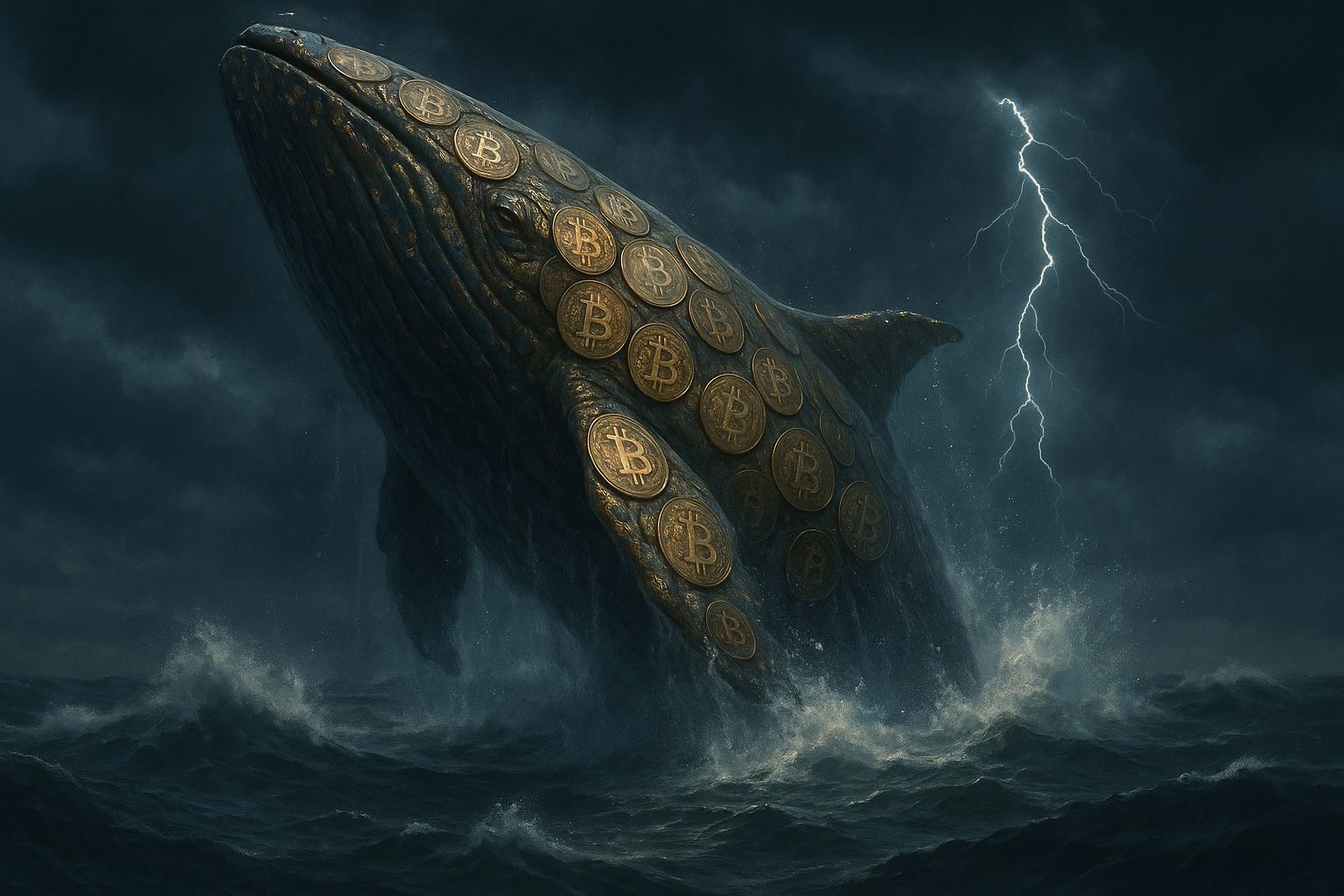- CROX ROAD
- Posts
- Is the $16B Bitcoin Whale Sell-Off the Start of a Bear Cycle?
Is the $16B Bitcoin Whale Sell-Off the Start of a Bear Cycle?
Bitcoin whales have sold $16B worth of BTC, sparking fears of a looming bear cycle. Is this a warning sign of market decline, or just another wave in Bitcoin’s volatile journey?
The Bitcoin market has once again been rocked by large movements from whales — individuals or entities holding significant amounts of BTC. According to recent reports, Bitcoin whales sold off $16 billion worth of BTC in just a few weeks, raising alarms among traders and analysts. While Bitcoin has experienced numerous whale-driven sell-offs in the past, the sheer scale and timing of this move has sparked speculation: are we witnessing the early signs of a new bear cycle?
Table of Contents

Understanding the Whale Sell-Off
Whales are defined as Bitcoin holders with over 1,000 BTC. Their actions often make headlines because their trades can move markets and influence sentiment. The recent whale activity saw more than 147,000 BTC offloaded, making it the largest sell-off since the last Bitcoin halving.
On-chain data suggests that these weren’t just short-term traders cashing out — many of the coins sold were long-dormant BTC, revived and sent back into circulation. This “revived supply” metric often signals profit-taking and reallocation by long-term holders.
Why Are Whales Selling?
1. Profit-Taking at High Levels
Bitcoin’s rally over the past year has seen major price appreciation. For whales who accumulated BTC years ago, these price levels represent an attractive opportunity to lock in profits.
2. Funding and Liquidity Needs
Some whales may be institutional players or early adopters liquidating BTC to fund business operations, acquisitions, or diversification into other asset classes.
3. Four-Year Cycle Hypothesis
Bitcoin historically follows a four-year halving cycle: halving → rally → top → correction. With the last halving in 2024, some analysts believe whales may see the current environment as a cycle peak — leading them to sell before a downturn.

Expert Warnings
Bitwise’s European head of research, André Dragosch, commented that large-scale selling by long-term holders is rarely a positive sign. When whales distribute their holdings, it often creates short-term pressure on the market and dents overall sentiment.
On-chain analysts like James Check have also flagged that long-held BTC reentering circulation suggests profit realization, which historically has preceded corrections.
Is This the Start of a Bear Cycle?
While whale selling is concerning, it doesn’t necessarily guarantee a prolonged bear market. Several factors complicate the picture:
Strong Demand: Institutional adoption, ETFs, and retail interest remain robust, possibly absorbing whale supply.
Macro Conditions: Global economic uncertainty, rate cuts, and weakening fiat currencies could fuel further Bitcoin demand.
Market Resilience: Despite whale selling, Bitcoin has held relatively steady in recent weeks — a sign that the market may be deep enough to withstand such distribution.
Historically, bear cycles have followed parabolic rises and euphoric sentiment. Current conditions don’t fully reflect that yet, leaving the debate open.
What Investors Should Watch
To determine whether this sell-off marks the start of a bear cycle, investors should monitor:
On-chain metrics: Dormant coins moving, exchange inflows, and whale wallet activity.
Market liquidity: Can the market absorb billions in sell pressure without sharp declines?
Macro shifts: Interest rate policy, inflation trends, and regulatory developments.
Price structure: If Bitcoin begins forming lower highs and lower lows, the technical case for a bear market strengthens.

Conclusion
The $16B Bitcoin whale sell-off is a headline-grabbing event that has undeniably rattled nerves across the crypto community. However, history shows that whale movements don’t always dictate the start of a bear cycle. While caution is warranted, the resilience of Bitcoin’s price, coupled with ongoing institutional demand, suggests the story may not be as bearish as some fear.
For now, the crypto world waits: is this the beginning of another winter, or just another wave in Bitcoin’s ever-volatile ocean?
FAQs
Who are Bitcoin whales?
Whales are individuals or entities holding over 1,000 BTC. Their large trades often move markets and influence sentiment.
Why is whale selling significant?
Large sell-offs can flood the market with supply, pressure prices, and trigger panic among smaller investors.
Does this mean a bear market is coming?
Not necessarily. While whale selling is concerning, market resilience and external factors like institutional adoption could offset the impact.
What should investors do?
Stay cautious, monitor on-chain metrics, and manage risk carefully. Diversification and long-term thinking are key.
Sponsored By:

Unlock the power of your Bitcoin with Money On Chain, the Bitcoin-backed DeFi protocol on RSK that issues DOC—a stablecoin pegged 1:1 to USD for rock-solid stability amid volatility, proven through overcollateralization and risk-sharing that survived the 2020 crash without a hitch. Harness BTC's unmatched security and censorship resistance while earning yields up to 20% via leveraged BPro tokens and governing with MoC for rewards and upgrades—all in a trustless, transparent ecosystem. Transform idle BTC into productive assets today: Visit moneyonchain.com and start building!
That's all for today, see ya tomorrow! If you want more, be sure to follow our X (@croxroadnewsco), Instagram (@croxroadnews.co), Youtube (@libertarianbtc), Tiktok (@croxroadnews) and nostr - [email protected]
VISIT OUR STORE

The Best Merch For Bitcoin Maxis
Visit Crox Road Store 👉🏻 https://croxroad.store/
FOLLOW US ON NOSTR

DISCLAIMER: None of this is financial advice. This newsletter is strictly educational and is not investment advice or a solicitation to buy or sell any assets or to make any financial decisions. Please be careful and do your own research.
You May Also Like
External Links
Chinese woman convicted after 'world's biggest' bitcoin seizure
Bitcoin and Gold Jump as Stocks Dip Amid US Government Shutdown
Bitcoin is getting a shutdown boost. More money could rotate into the crypto and out of gold
US Treasury Softens Crypto Tax Rules, Easing Pressure on Bitcoin Taxes
Pro Bitcoin traders’ view on BTC’s flash crash to $112.6K: Did anything change?
Links From Our Sponsors
If You Like Our Content And Want To Help Us To Make It Better, You Can Buy Us One (Or More!) Coffee CLICKING HERE
Reply